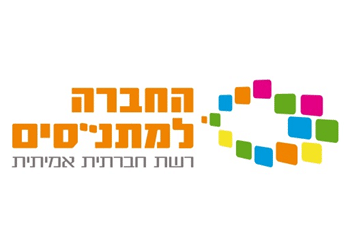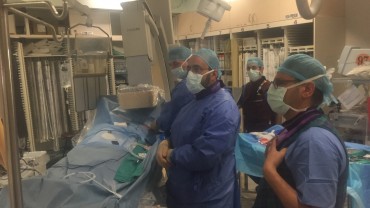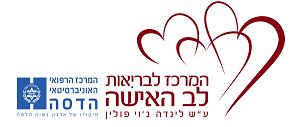
Think Global Act Local
The Jerusalem Municipality is divided into 32 districts, and each district is responsible for local urban planning and the interaction between local citizens and the City. Funding from the City is funneled through these agencies, which also serve as community centers. These centers have the potential to promote health in countless ways, from mandating green
- Published in Uncategorized

Community-based Healthy Lifestyle Promotion
The increased incidence of diabetes in the Arab community, as well as the 60% higher rate of cardiovascular mortality in Arab women led us to the development of an intensive community-based intervention program, focused on cardiovascular wellness and diabetes prevention. Based on The Diabetes Prevention Program of the American Center for Disease Control, the Pollin
- Published in Uncategorized

Over the last 15 years, the death rate from heart disease has decreased in women in the United States and Israel. Despite the improvement, on the last census report, more women died from cardiovascular disease in Israel than from all the different types of cancer put together. Heart attacks are increasing in young women, likely
- Published in Uncategorized

Seven kilograms – that’s the amount of weight that MB lost during the three months that she participated in the Pollin Center “Ambassadors for Health” ( Ambassadors) program. MB, a project manager in Israel’s civil service, did not anticipate the profound impact Ambassadors would have on her personal life. em Ambassadors empowers public sector, female
- Published in Uncategorized

Who We Are – What We Do
Cardiovascular prevention and health promotion are fields that are progressing and evolving. The Hadassah Pollin Center is at the forefront of development and implementation in the field of health promotion. We are creating supportive environments that promote positive health behaviors, working to change default behaviors to those that promote health and wellness. a We maximize
- Published in Uncategorized

Questions and Answers: Q: What is a pacemaker? A: pacemaker is a small device that is placed in the chest so as to deliver low-energy electrical pulses as needed to prompt the heart to beat at a normal rate. Q: What is the difference between a pacemaker and a defibrillator? A: A defibrillator is
- Published in Uncategorized

Prof. Dan Gilon, September 2016 Interventional cardiology continues to raise the bar, targeting new diseases, and developing interventions that require paradigm shifts. The first 3 decades of intervention concentrated on the treatment of coronary artery disease, with new approaches – specialized balloons, wires with coatings, bare-metal stents, drug-eluting stents and more. Recently, we have begun
- Published in Uncategorized

The fall brings with it the chill wind, autumn foliage, bird migration – and also the Flu. Influenza (the Flu) is a contagious viral disease that attacks your respiratory system – the nose, throat and lungs. In most cases it is mild, but in severe case it can lead to complications such as pneumonia and
- Published in Uncategorized

David Orenstein, FHRS, CEPS, CCDS Cardiac Electrophysiology Technician, Hadassah Medical Center With the increase in longevity and the stability of complicated patients with multiple illnesses, there are more and more patients who suffer from slow heart rate events (bradycardia) or who are at risk of dangerous fast heart rates (tachycardia). These patients require pacemakers to
- Published in Uncategorized
Search
Recent Posts
Abuse and Heart Disease
Abuse and Heart Disease: Exposure to trauma and...The Fake News Fiasco
We are exposed to a tremendous amount of inform...Coaching For Change
The Pollin Center’s health coaching group is an...When on-line is off limits: Innovative Corona-tailored health promotion program for Ultra-orthodox women – Chevruta L’Chaim
Ultra-Orthodox (Haredi) women have worse health...21444
The stress, apprehension and the fears coupled ...
